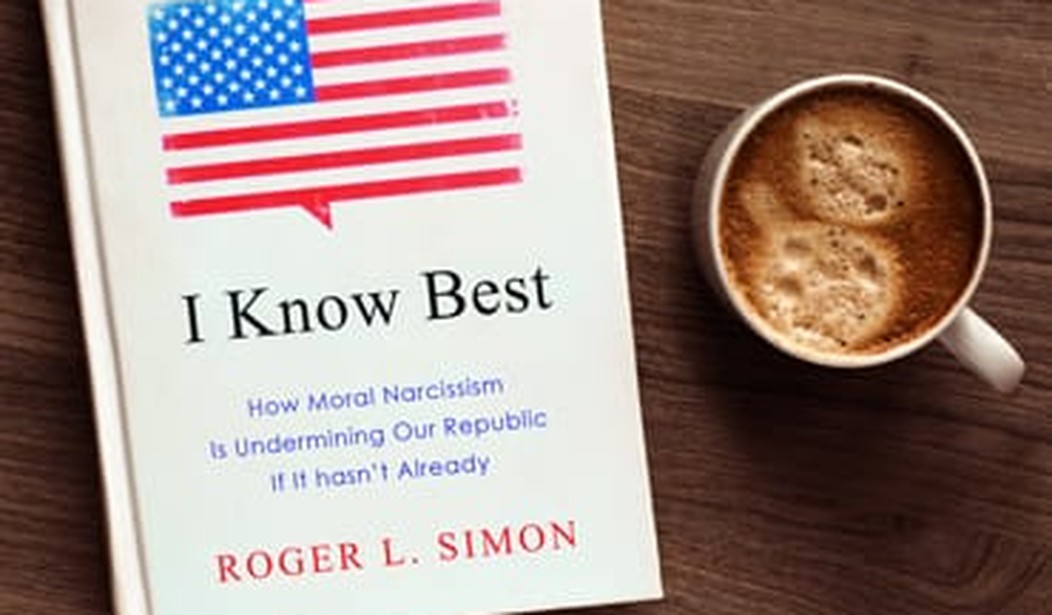If there’s one thing that distinguishes 21st-century America from her recent past, it’s her cocksure attitude. Not the old-fashioned, can-do swagger of the Gilded Age plutocrats or the postwar military and financial hegemons, but the smirking, snarking intolerance of the Anointed, whether of left or right, who feel their world-view (well-educated but abysmally ignorant, they wouldn’t know the meaning of the word Weltanschauung, or even the German word itself) is self-evidently correct, and who can tick off the “principles” by which they operate like any rote-drilled catechumen. Whether they go by the name of “progressive socialists” or “movement conservatives,” they’re brothers beneath the skin, and they both suck.
That skin gets a good hiding, if not a thorough flaying, in the pages of Roger Simon’s new book, I Know Best: How Moral Narcissism Is Destroying Our Republic, If It Hasn’t Already (Encounter Books). Launching with a quote from Oscar Hammerstein’s lyrics to “Stonecutters Cut It on Stone” from Carousel (“there’s nothing so bad for a woman as a man who thinks he’s good”), and splashing down in the preening nihilism of John Lennon’s “Imagine,” this equal-opportunity guided missile of scorn and sound advice is sure to have something to thrill, and offend, everybody.
Simon, the author of the Moses Wine series of detective novels and an Oscar-nominated screenwriter, came to his idiosyncratic brand of conservatism late. (Like many in Hollywood, he is a social liberal and a foreign-policy conservative.) A civil-rights worker in the Sixties, he was stunned by the O.J. Simpson acquittal in the Nineties and by the chasm that had suddenly yawned between black and white Americans. Like many other of the so-called “neocons,” he took a sharp right turn after the events of 9/11. The CEO emeritus of PJ Media, he’s now a columnist and roving political reporter for the site, and remains an active screenwriter.
In other words, like most sentient people, he’s changed his mind on various subjects throughout his life. But what interests him in this book is why, latterly, so many seem to be completely resistant to change and remain invincibly unshaken by world-historical events even when, as happened on 9/11, two of the tallest buildings in the world came tumbling down right in their backyards. Simon dubs this phenomenon “moral narcissism,” and his book is an examination of it in various facets of modern political and social life.
Simon (b. 1943) bases his analysis on the experiences of his own generation, which he calls the Least Great Generation, to distinguish it from the one that came just before, which fought and won World War II. Building on Christopher Lasch’s seminal 1979 study, The Culture of Narcissism, Simon explores such generational obsessions (quasi-religions for atheists, really) as Marxism, environmentalism, “climate change,” racism, Islam, the corruption of the universities and the media, and a twilight nostalgia for great moral crusades of yesterday. But mostly, the bugbear known as political correctness:
Narcissim has taken over our society to such an extent that we cannot see straight. It has disconnected us, or a great many of us, from reality, and is in the process of undermining what tiny bit of democracy we have left. Every even mildly unconventional thought has a “trigger warning” lest someone be offended. Narcissism is making us blind. It is the secret sauce destroying America from within. It is also the handmaiden of perpetual distraction, the misdirection that prevents us ever from solving anything.

Narcissus, mon amour.
One of the most baleful manifestation of this mind-set is the fundamentally leftist notion that good intentions count for everything, results for nothing. In part this has come about because the Eloi left prizes wit, faux-erudition and credentialism (our current president is the avatar) as distinguished characteristics that set it apart from the Morlock right: “If your intentions are good, if they conform to the general received values of your friends, family and co-workers, what a person of your class and social milieu is supposed to think, everything is fine.” A glance at the incestuous relationships of the private-school educated, Ivy League-certified media and political classes makes it clear that America is currently controlled by a group of people who went to school together, are related to each other, sleep with each other, have affairs with each other, live with and near each other, maintain city apartments and country homes within miles of each other, vacation together and support each other, whether by means of flattering coverage, votes, or revolving-door jobs. It’s a scandal, but nobody cares.
Across the aisle, in the tulies of the right, a similar self-delusion exists. Simon cites the failed neocon project of bringing democracy to savage and benighted lands where head-sawing and boy-buggery are the national pastimes. One might add to that the current fixation on “movement conservatism,” especially among those under the age of 50, who came of age during (or, worse, were actually born into) the Reagan Revolution and think they’re somehow its legitimate inheritors.
The book is at its strongest when it dismantles (from the inside, as it were) the pretensions of the “progressive” left as tribunes of the People. When, as a quick survey of the Democrat party reveals, they’re little more than swanning aristos in thrall to Goldman Sachs or inherited wealth — or, in the case of gigolo John Kerry, the inherited wealth of two wives; for a Democrat, nothing says you’ve made it like claiming the fortune of a dead Republican senator by wooing and marrying his widow.
Further, Simon rightly puts the blame for the proliferation of alphabet-soup agencies, which have morphed from a do-gooder’s wet dream into rogue fiefdoms of the executive branch, forever roaming the country in search of dragons to slay, where it belongs — on the Nixon administration, which gave us, among other things, the EPA and OSHA. It never seems to occur to conservatives or Republicans that, like the religious postulate who meets a man and winds up in the whorehouse, what might have been conceived in virtue can quickly turn to vice.
Much of I Know Best, fittingly, is based on Simon’s own political experiences, including covering the Copenhagen “climate change” conference, and learning to love the Second Amendment after a a trip to the gun range with former Texas governor and presidential candidate Rick Perry. But the most personal material comes as Simon looks back on his youthful efforts on behalf of the civil-rights movement, and how it has been transmogrified into what he challengingly calls “Nostalgia for Racism.”
What do I mean by nostalgia for racism? Well, an entire generation of people, many black but a fair number of whites, yearned for those halcyon days of the civil rights movement when good was good and evil was evil. Bull Connor and his racist ilk were monsters and Martin Luther King and John Lewis were heroes and we all knew what to think and feel…
(Here, one might well interject: wasn’t that a textbook case of moral narcissism, as defined by the author?)
It was nostalgia for a simpler time, nostalgia for an era when good people, black and white, could parade their righteousness for the world to see. But then life got complicated. Nothing was getting resolved. The inner cities remained what they were… and when someone offered a new idea, it seemed to disappear in a maw of conventional wisdom, never to appear again.
The grim fact is that age and experience have a way of destroying youthful illusions, and that the truth is the world is a harsh, cold, unfeeling place that does not generally respond to youthful admonishment. The election of the first black president should have been the culmination of everything northern liberals and southern blacks fought for; and yet, as embodied by Barack Obama, the triumph seems wan, small, hollow.
Simon slams home the case against moral narcissism in a chapter on Islam and the threat it poses to western society. But, crippled by PC, we have been unable to fight this civilizational cancer with the same moral certainty in whose name we atomized National Socialist Germany and the Empire of Japan. “Removing such discussion from foreign policy arguments was one of the most significant outgrowths, if not the most significant, of the rise of moral narcissism and political correctness in the post-Vietnam era. If all cultures were equal, or even nearly equal, then to annihilate, even severely wound one, was inexcusable.” Tell that to the Phoenicians or the Carthaginians.
And maybe that’s the real lesson of I Know Best — plus ça change, plus c’est la même chose. The fashionable moral pretenses of the upper classes (“luxurious leftism, limousine liberalism) are, in the end, impervious to argument — although, as Louis XVI discovered the hard way, not to violent revolution. The consistently failing Five Year Plans of the Soviet system simply migrated to Europe and America after the U.S.S.R. collapsed, reappearing in fresh drag as the European Union’s top-down regulation and, here in the U.S., as Obamacare. With the rise of an American nomenklatura based on power and money, writes Simon, “We have developed our own ‘red bourgeoisie’.”
That’s a depressing thought, made all the more depressing because it’s true. And this, I think, is something that “movement conservatives,” busily ticking the aphoristic boxes of Burke, Buckley and Reagan, simply do not understand: they lost. For decades, conservatives have consoled themselves that we live in a center-right country, but the truth is, we don’t. The Least Great Generation may have sown the seeds of doubt in the primacy of western civilization (whence comes true conservatism), but it was the Baby Boomers who demolished the postwar socio-political consensus, irrevocably. The two or three generations that have followed are like blind archaeologists, sifting through the shards of a culture they don’t quite understand and therefore cannot replicate. With culture gone and religion waning, we are in big trouble. “Moral narcissim is the very petri dish of evil.”
What cheer, then? For one thing, race and racial grievances, currently at their apogee, are like to diminish as America heads into a profound demographic change. More “diversity,” however, is likely to result in more, rather than less, de facto residential segregation as the melting pot devolves into tribalism. The tide of Islam, as our colleague David Goldman has pointed out, is also likely to recede; Islam cannot succeed as a governing philosophy owing to its moral hollowness and its brutality and as it conflicts with modernity it loses the source of its power, which is — or was — its fecundity. But these are weak emoluments.
Simon concludes I Know Best by outing himself as a “libertarian neocon,” a believer in smaller government and a more muscular foreign policy. “Those who wish to roll up the gangplanks and live in some libertarian nirvana, letting the rest of the world stew, strike me as naive beyond words. If you want to have paradise — or even a halfway decent existence — you have to be prepared to defend it.”
So that’s my moral narcissism — how “I know best.” Factor it in, but as you do, be sure to factor in that of others. It’s all around us, the most prevalent disease of our times. I have it, you have it, and everyone else has it too.
What’s yours?
[Full disclosure: Roger Simon hired me as a columnist for PJ Media, and we are friends and colleagues in both the novel-writing and screenwriting trade, so feel free to consider the above in that light.]








Join the conversation as a VIP Member